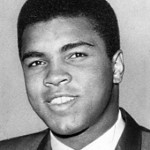 Muhammad Ali (1942-2016) was an American professional boxer known for his outspokenness, particularly on political issues. Ali was born Cassius Clay, the son of a flamboyant but hard-drinking painter from Kentucky. As a boy, Cassius Clay was encouraged to take up boxing by a local policeman. By the late 1950s, he had won several state and national titles. Still an amateur, in 1960 Clay participated in the Rome Olympic Games, where he won gold in the light heavyweight division. He turned professional shortly after. In February 1964 Clay defeated Sonny Liston to claim the world heavyweight championship. Later that year he joined the Nation of Islam, an American Muslim movement, and changed his name to Muhammad Ali. Despite being a relative newcomer to professional boxing, Ali was known for his colourful slogans and turns of phrase and his humorous ridiculing of opponents. He was also effusive about his own talents, once claiming to “float like a butterfly and sting like a bee”.
Muhammad Ali (1942-2016) was an American professional boxer known for his outspokenness, particularly on political issues. Ali was born Cassius Clay, the son of a flamboyant but hard-drinking painter from Kentucky. As a boy, Cassius Clay was encouraged to take up boxing by a local policeman. By the late 1950s, he had won several state and national titles. Still an amateur, in 1960 Clay participated in the Rome Olympic Games, where he won gold in the light heavyweight division. He turned professional shortly after. In February 1964 Clay defeated Sonny Liston to claim the world heavyweight championship. Later that year he joined the Nation of Islam, an American Muslim movement, and changed his name to Muhammad Ali. Despite being a relative newcomer to professional boxing, Ali was known for his colourful slogans and turns of phrase and his humorous ridiculing of opponents. He was also effusive about his own talents, once claiming to “float like a butterfly and sting like a bee”.
Unlike most boxers, who relied on their managers as ‘front men’, Muhammad Ali spoke freely on a range of topics outside boxing, particularly political and social issues. A proud and intelligent man, Ali was particularly outspoken about the mistreatment of African-Americans in a white-dominated society. He was also opposed to the Vietnam War – and this opposition had a direct impact on his life. In 1966 Ali was drafted for military service. He applied for ‘conscientious objector’ status, on account of his religious views but this application was refused. Ali was called up for service in April 1967. A month before his induction, Ali made his strongest statement against the war, declaring that he would never serve “the white slave masters of the darker people the world over”.
Ali attended his induction in Houston, Texas but refused to step forward or take the oath, leading to his arrest. He was later convicted of violating the Selective Service Act, fined $US10,000 and sentenced to five years in prison. Ali remained free on appeal and his sentence was overturned by the US Supreme Court in 1971. He was unable to box for several years, having been stripped of his boxing license and titles after his arrest. During this time Ali became a figurehead for the anti-war movement, speaking regularly at universities and political rallies. He returned to the ring after his conviction was overturned. Ali regained the world championship in 1974, defeating George Foreman in Zaire. He retired in 1981 and in later years suffered from poor health, being diagnosed with Parkinson’s Disease in 1984. Ali died in June 2016.
© Alpha History 2018. Content on this page may not be republished or distributed without permission. For more information please refer to our Terms of Use.
This page was written by Jennifer Llewellyn and Steve Thompson. To reference this page, use the following citation:
J. Llewellyn & S. Thompson, “Muhammad Ali”, Alpha History, accessed [today’s date], https://alphahistory.com/vietnamwar/muhammad-ali/.
